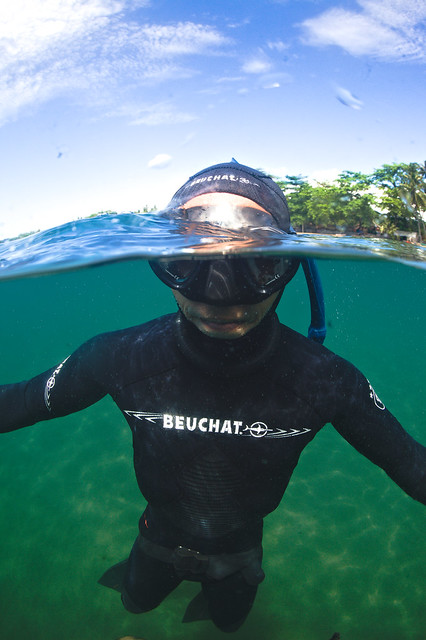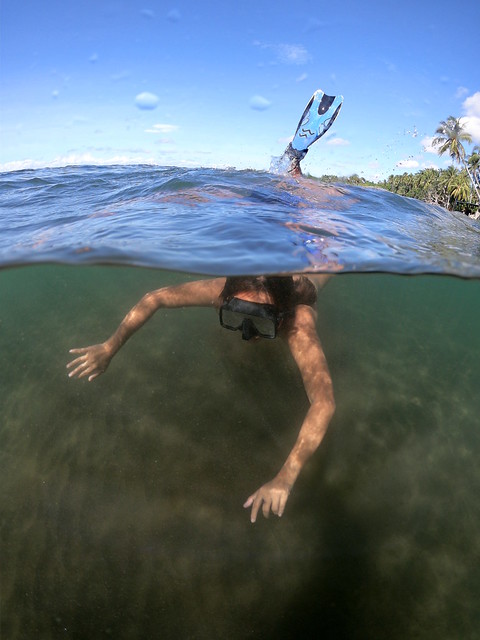Scuba Fitness: The Basics
I have been a scuba instructor since 2014, and have greatly enjoyed teaching students of all levels, from “discover scuba diving” to technical (decompression) diving. Most dive courses I taught were great fun, and some of my students turned out to be excellent divers after only a few dives. Still, there are some fitness problems which had kept other students from learning at an ideal pace. I have observed these problems repeatedly, and they fall into three classes. How can you avoid being impeded by the same problems? Understand them, and take counter-measures if necessary:
1. Stop Bad Lifestyle Choices
Smoking, alcohol beyond a drink after dinner, heavy unhealthy food, stress and a lack of sleep will impair your progress in diving training.
I like beer. I drink less of it now than in my 20s, which is probably natural, but I still drink it. But I don’t drink more than one the evening before I go diving the next day. A hangover is bad news when planning to go underwater for several reasons: you are dehydrated, which is compounding the physiological stress from breathing dry, compressed air, and from being at increased pressures underwater. On top of that, even being moderately hungover will diminish your ability to concentrate, which is extra bad if you are not just diving but taking dive training.
“I’m not having a hangover after 5 beers” you might argue. Yes, not a bad one if you are a big dude who is a regular beer drinker. You might be used to it. But there will still be an effect on your physiology and ability to concentrate on that day.
The same goes for poor sleep & diet and stress: they are going to impede your diving physically and mentally, and even more so your diving training.
Take a minute, sit down on your couch, and reflect where you could improve your life style choices before starting your scuba training. And don’t do this the day before you start your open water course, do it a few weeks before, so that you still have the chance to correct things. You don’t have to become a monkish health fanatic before you start diving, but you don’t want to be a sleep deprived poorly fed and dehydrated dude with his thoughts somewhere else. How far should you take these life-style improvements? This is a judgement you have to make. You don’t have to stop partying to become a diver of course, just don’t party the evening right before your open water course. Common sense goes a long way, but I have seen some students who struggled because of such problems.
2. Fix Your Fitness Weakness
You don’t have to be a champion powerlifter to hoist scuba gear around, and you don’t have to be a marathon finisher to make it through 90 minutes a piece of beginner dive training. But you shouldn’t have obvious fitness weaknesses, and a lot of people have these, due to a lack of exercise in their lives. Interestingly, I have often seen fairly lean scuba students with these fitness deficits. Eating little alone won’t get you fit, you have to exercise as well.
Scuba diving doesn’t need great athletic ability in one area, but you should be okay in all areas of fitness, such as strength, endurance, flexibility and balance:
So ask yourself:
Can you slowly jog without stopping for 10 minutes?
Can you come within 10 centimeters of touching your toes with your legs straight when bending forward?
Can you stand on one leg for 30 seconds without falling over?
Can you do 5 reps of barbell squats with half your body weight on the bar?
Below I am doing 10 reps with my bodyweight (110 kgs) on the bar. I have been practicing. I suggest you should be able to do half that relative weight, for half the reps.
View this post on Instagram
All of these skills are very trainable, and I have chosen relatively low thresholds on purpose. Everyone who is healthy can train themselves within weeks to be able to do 5 half-bodyweight-on-the-bar squats. For a 80 kg man that’s only 40 kgs, and for a 40 kg woman, that’s only 20 kgs, the weight of an Olympic lifting bar without any weight plates. “Beginner gains”, the progress upon taking up weight training, come fast and easy with some motivation and enthusiasm.
Yes, there could be medical reasons that you can’t do some of these. If you have a bad back, you can still dive; you put on your gear in the water; you might not want to do back squats, but nevertheless you should fix your fitness gaps. If you are in a wheelchair, you can also definitely learn to dive – I have taken a dude in a wheelchair on a “Discover scuba dive” and he did great, and enjoyed it a lot. Modify the fitness tests then, according to your body. Maybe assess and improve your arm strength. There are amazing Paralympics athletes, of course, and you can be very fit with a handicap. The point remains the same: Make sure you have achieved a basic fitness level, in all aspects of fitness, before you start your dive training.
3. Get Comfortable in the Water
I have seen students who had no problem with points number 1 and 2, but still struggled, because they were not comfortable being afloat. Once in the pool or ocean beyond the point where they could stand, their fear of being in the water – a very basic fear for a land mammal like a human – kept them from relaxing, and enjoying & profiting from their scuba training. You can’t learn well if you are afraid. These students were so afraid of being in deep water that it was difficult to teach them how to take care of themselves when in deep water.
This problem can be solved, with slow habituation. If you live near the ocean or a lake, go for a snorkel. Start where you can stand, and progress to deeper areas after a couple of snorkeling trips. Bring a friend so that you feel – and are – safer.
If you don’t live near the ocean, go for regular swims in a nearby pool. Actually swimming laps also helps your fitness level, but simply being in water too deep to stand, while floating or playing volleyball does a lot of good for your in-water comfort level. Eventually you will be able to float in mid-water without worrying about getting water up your nose, and you’ll be able to pay attention to your scuba training. Again, the key here is to not rush anything, go step by (small) step, and enjoy yourself along the way. Take your time. Breathing so that you inhale only when your head is out of the water is key.
Think of the water time like moving to a new country: At first you are clueless about the place, but after a few weeks you know where to get a good coffee and where to do your laundry. You might feel a bit uneasy at first, but eventually your comfort zone expands. The same will happen with you floating in deep water.
I hope that these tips help. If you sign up for an open water scuba course, go through this checklist and fix what needs fixing, and you’ll be a good scuba diver in no time.
Check out my frank guide to underwater bodily functions as well!
Finally I have a scuba diving weight loss tip:
Best Fishes,
Klaus



